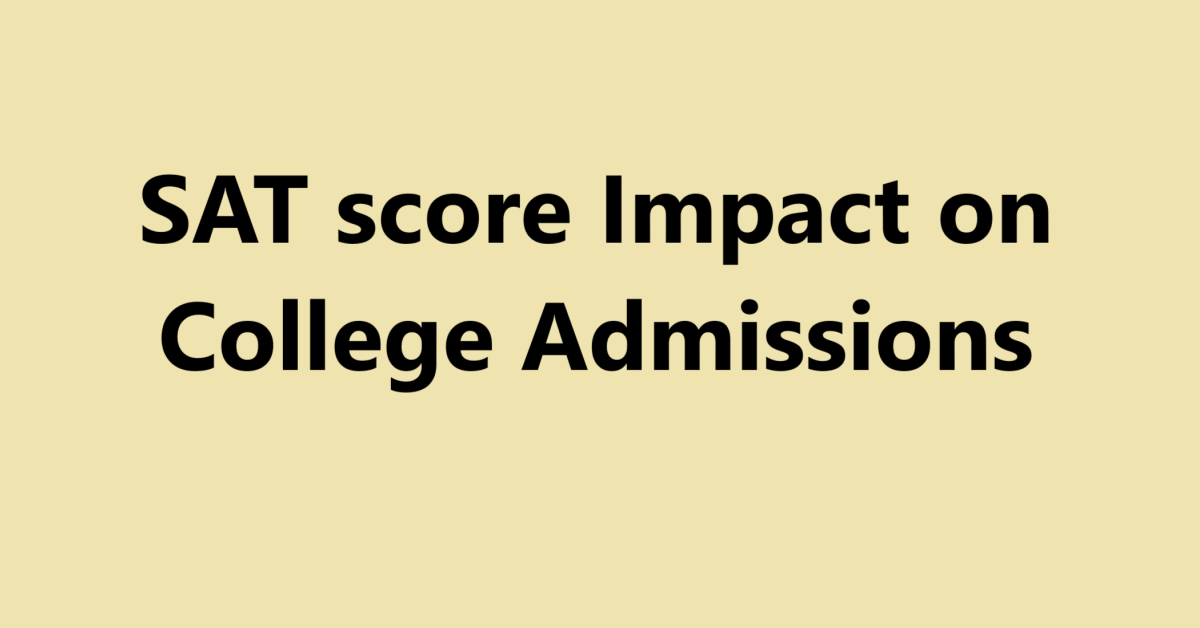The impact of SAT scores on college admissions can vary significantly depending on the institution and its specific admission policies. Here’s a detailed overview of how SAT scores can influence college admissions:
1. Role of SAT Scores in College Admissions
- Standardized Assessment: SAT scores provide colleges with a standardized measurement of a student’s readiness for college-level work. They are often considered alongside high school GPA, letters of recommendation, extracurricular activities, and personal essays.
- Academic Benchmark: Many colleges use SAT scores to assess academic preparedness and to help predict a student’s potential success in college.
2. Variability Among Colleges
- Test-Optional Policies: Many colleges and universities have adopted test-optional or test-flexible policies, allowing students to decide whether to submit their SAT scores. In some cases, schools may focus more on GPA and coursework rigor.
- Selective vs. Non-Selective Schools:
- Selective Institutions: Highly selective colleges may place greater emphasis on SAT scores due to the competitive applicant pool. A strong SAT score can enhance an application and help differentiate candidates.
- Non-Selective Institutions: Less selective schools may not weigh SAT scores as heavily and may prioritize other aspects of the application, such as personal statements and interviews.
3. Score Ranges and Admission Decisions
- Middle 50% SAT Range: Many colleges publish the middle 50% SAT score range for admitted students. Being within or above this range can strengthen your application.
- Merit-Based Scholarships: High SAT scores may also qualify students for merit-based scholarships offered by colleges, which can significantly impact the affordability of education.
4. Assessment of Specific Skills
- Score Breakdown: The SAT assesses skills in critical reading, writing, and math. Colleges may look at these sections individually to see where a student excels or may need support.
- Essay Component: Some schools may also consider the optional SAT Essay scores if submitted, particularly those that value writing and communication skills.
5. Comprehensive Review Process
- Holistic Admissions: Many colleges adopt a holistic admissions approach, considering the entire applicant profile rather than focusing solely on test scores. Factors like leadership roles, community service, and personal background also play a crucial role.
- Personal Statements and Interviews: Personal essays and interviews can provide context to SAT scores, allowing applicants to explain challenges they’ve faced or to showcase their passions and goals.
6. Trends and Changes
- COVID-19 Impact: The COVID-19 pandemic led many colleges to reevaluate the importance of standardized testing, resulting in a significant increase in the number of schools adopting test-optional policies.
- Long-Term Trends: The trend toward reducing the emphasis on standardized tests may continue, encouraging institutions to find new ways to assess student potential and aptitude.
7. Making Your Application Stand Out
- Focus Beyond Scores: If you are concerned about your SAT scores, you can enhance other parts of your application. Engage in extracurricular activities, pursue leadership positions, and highlight unique experiences in your essays.
- Consult School Counselors: They can provide advice on how to strengthen your application and understand specific institutional preferences regarding standardized tests.
SAT Score Impact on College Admissions FAQs
Here are some frequently asked questions (FAQs) about the impact of SAT scores on college admissions, along with clear answers:
1. Do all colleges consider SAT scores in their admissions process?
- Answer: No, not all colleges consider SAT scores. Many institutions have adopted test-optional policies, allowing students to decide whether to submit their scores. Some colleges may prioritize other components of the application, such as GPA, extracurricular activities, and personal essays.
2. How important are SAT scores for college admissions?
- Answer: The importance of SAT scores varies by institution. Highly selective colleges may place greater emphasis on scores due to the competitive applicant pool, while less selective colleges may focus more on overall academic performance and personal attributes.
3. What is the middle 50% SAT score range?
- Answer: The middle 50% SAT score range represents the scores of the middle half of admitted students at a given college. Being within or above this range can strengthen your application, but schools consider many other factors as well.
4. Can a low SAT score be compensated for by other aspects of my application?
- Answer: Yes, a lower SAT score can sometimes be offset by strong grades, compelling personal statements, recommendation letters, leadership roles in extracurricular activities, and unique life experiences. Many colleges use a holistic admissions process to evaluate applicants.
5. How can SAT scores affect scholarship opportunities?
- Answer: High SAT scores may qualify students for merit-based scholarships offered by colleges. These scholarships can significantly reduce the cost of attendance, making a strong performance on the SAT beneficial.
6. Are there colleges that do not require SAT scores at all?
- Answer: Yes, there are many colleges that do not require SAT scores, especially among those adopting test-optional or test-flexible policies. Always check individual college admissions websites for specific requirements.
7. What role do SAT subject tests play in college admissions?
- Answer: Some colleges used to require or consider SAT Subject Tests, but many have phased them out. You’ll need to check each college’s current policies, as they can vary.
8. How have recent trends affected the consideration of SAT scores?
- Answer: Due to the COVID-19 pandemic, many colleges have adopted test-optional policies or made standardized testing less central to their admissions processes. This trend may continue as institutions seek more equitable ways to evaluate applicants.
9. How can I improve my chances if my SAT score is not where I want it to be?
- Answer: Focus on strengthening other aspects of your application, such as achieving a high GPA, engaging in meaningful extracurricular activities, writing a compelling personal essay, and obtaining strong letters of recommendation.
10. Will submitting my SAT scores always help my application?
- Answer: Not necessarily. If your SAT scores are below the average for admitted students at a college, it might be better to withhold them, especially if other parts of your application are stronger. Ultimately, it depends on the specific college’s policies and how your scores compare to their admitted student profile.
Conclusion
While SAT scores can significantly impact college admissions, their role is increasingly contextual and variable based on individual institutions’ policies. Prospective students should be aware of these dynamics and prepare a comprehensive application that showcases their academic potential and personal strengths.


